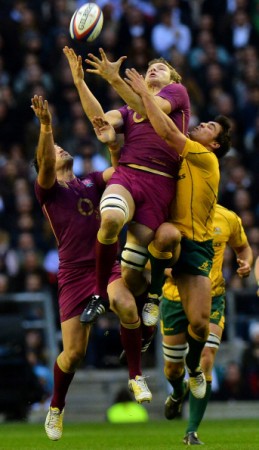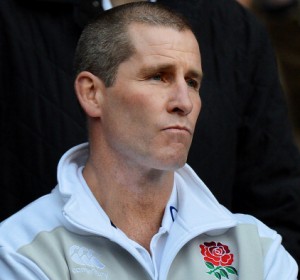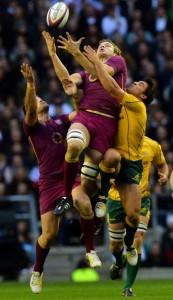
A try or not a try? Manu Tuilagi stretches for the line and was awarded a try – but did the ball hit the whitewash?
By Alex Lowe
STUART LANCASTER had described this autumn as “production time” for England. The Fiji Test was a nice dress rehearsal but Australia was the big opening night. And England fluffed their lines badly.
The desperate pre-match ‘entertainment’ killed off any atmosphere or sense of anticipation inside Twickenham and the Wallabies then left England feeling similarly flat. Australia had too many ideas in attack and too much nous in defence for England’s greenhorn side, who were on the receiving end of an 80-minute reality check.
The post-match talk of learning and development sounded particularly hollow given it was England themselves who said now was time to deliver. But they were taught key lessons in how to be streetwise and savvy with and without the ball. The creative variety offered by Kurtley Beale and Berrick Barnes was a lesson to England about how to use twin playmakers at fly-half and full-back.
In contrast, England were stilted in attack, made uncharacteristic defensive mistakes, lost the breakdown battle and toiled in the scrum. Warren Gatland was at the game. It is perfectly feasible the only entries he made to his Lions selection notebook were lines through the name of England players.
Somehow they remained in the game, thanks largely to Manu Tuilagi’s controversial try, awarded despite the television match official having no conclusive proof the ball had been placed on the whitewash.
While we are on the subject of Tuilagi, he is fast becoming more of a problem for England than a solution. Yes, he runs powerfully, busts the gain-line and draws defenders, but he has no vision, no distribution and no kicking game. Tuilagi got away with not passing when he scored the try but Chris Ashton was left furious just before the hour mark when he was left in space as the Leicester juggernaut ploughed into contact.
It was only when Lancaster sent on Tom Wood, Joe Launchbury and Mako Vunipola for the final quarter that England played with any vibrancy but they lacked the control and execution to make it count.
Lancaster said he backed Chris Robshaw’s decision not to go for the posts with four second-half penalties but it was plainly the wrong decision. Australia kicked their goals and won the game.
With 22 minutes remaining, in such a tight game, England had to take the points. They didn’t, in the belief they had Australia on toast in the driving lineout but Thomas Waldrom dropped the ball over the line.
With that duffed chance went the game and a wasted opportunity to claim a rare southern hemisphere scalp. This was the biggest setback of Lancaster’s regime because it was a game England could and should have won. Next up is the no small task of South Africa and then New Zealand, the two leading sides in world rugby and changes are a must.
England need men for the big stage. Alex Corbisiero has to start for Joe Marler, who struggled against Ben Alexander, and England need Tom Wood back on the blindside. Launchbury would offer a more dynamic second-row threat than Tom Palmer and Jonathan Joseph should come back into the midfield, with Tuilagi shifted either back to inside-centre or onto the wing.
Follow Alex Lowe on Twitter @AlexMLowe







